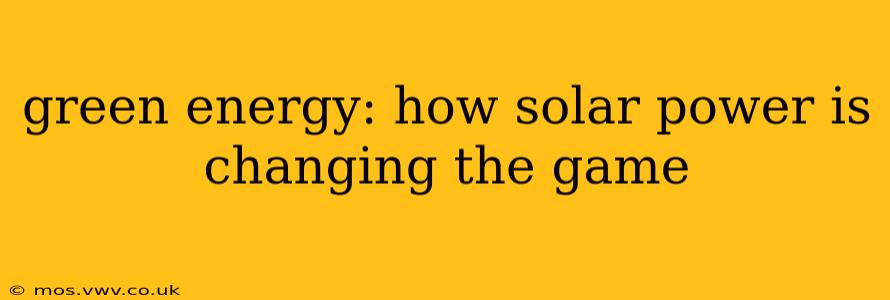The world is hungry for clean, sustainable energy, and solar power is leading the charge. No longer a niche technology, solar is rapidly transforming the energy landscape, offering a viable and increasingly cost-effective alternative to fossil fuels. This revolution is impacting everything from individual homes to large-scale power grids, driving significant changes in how we generate and consume electricity. This article explores the profound impact of solar power on our quest for green energy.
What are the benefits of using solar power?
Solar power boasts a multitude of benefits, making it an attractive option for individuals, businesses, and governments alike. The most significant advantage is its environmental friendliness. Unlike fossil fuels, solar energy produces no greenhouse gas emissions during operation, contributing to a cleaner and healthier planet. This reduces our carbon footprint and combats climate change. Beyond environmental benefits, solar energy offers significant economic advantages. While the initial investment can be substantial, falling solar panel prices and government incentives are making solar power increasingly affordable. Furthermore, solar energy offers energy independence, reducing reliance on fluctuating fossil fuel prices and ensuring a stable energy supply. Finally, solar power is a readily available and abundant resource, present in most parts of the world.
How does solar power work?
Solar panels, also known as photovoltaic (PV) panels, are the heart of solar energy systems. These panels are made up of numerous solar cells, typically composed of silicon. When sunlight hits these cells, it creates an electrical current through the photovoltaic effect. This direct current (DC) electricity is then converted into alternating current (AC) electricity by an inverter, making it suitable for use in homes and businesses. This AC power can then be used to power appliances, lights, and other electrical devices, or fed back into the electricity grid through net metering programs.
What are the different types of solar power systems?
There are several types of solar power systems catering to various needs and scales. Grid-tied systems are the most common, connecting directly to the electricity grid. Excess energy generated is fed back into the grid, while the home draws power from the grid when solar production is insufficient. Off-grid systems operate independently of the grid, typically using batteries to store excess energy for use at night or during periods of low sunlight. These systems are ideal for remote locations or areas with unreliable grid power. Hybrid systems combine the benefits of both grid-tied and off-grid systems, offering flexibility and resilience.
What are the environmental impacts of solar power?
While solar power is undeniably a clean energy source, it's important to acknowledge its environmental impact throughout its lifecycle. The manufacturing of solar panels requires energy and resources, including silicon, metals, and plastics. However, the overall environmental footprint of solar power is significantly lower than fossil fuels, particularly considering the long lifespan of solar panels and their ability to generate clean energy for decades. Responsible recycling and end-of-life management of solar panels are crucial to minimizing any negative environmental impact.
How much does it cost to install solar panels?
The cost of installing solar panels varies widely depending on factors like system size, location, installation complexity, and available incentives. While the initial investment can seem significant, numerous financing options and government subsidies can help offset the upfront cost. Moreover, the long-term savings on electricity bills often outweigh the initial expense. It's crucial to obtain quotes from multiple reputable solar installers to compare pricing and services before making a decision.
Is solar power reliable?
The reliability of solar power depends on several factors, including weather conditions, system design, and maintenance. While solar energy production fluctuates throughout the day and seasonally, advancements in battery technology and smart grid integration are mitigating these challenges. With proper planning and system design, solar power can provide a reliable and consistent energy source for homes and businesses.
What is the future of solar power?
The future of solar power looks incredibly bright. Continued technological advancements are driving down costs, increasing efficiency, and improving the reliability of solar energy systems. Government policies and incentives are further accelerating the adoption of solar power globally. As the world transitions towards a cleaner energy future, solar power is poised to play an increasingly central role, helping to meet growing energy demands while reducing our reliance on fossil fuels and mitigating the impact of climate change. The ongoing research into new solar technologies promises even greater efficiency and affordability in the years to come.
